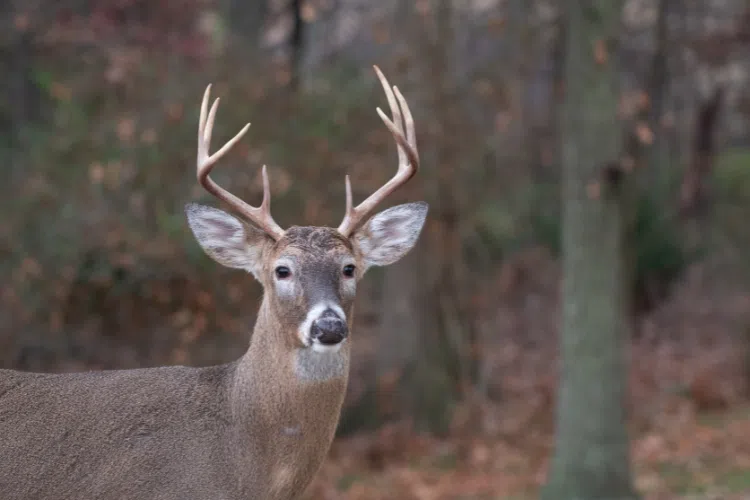
With an estimated white-tailed deer population of nearly 1.5M, Alabama offers deer hunters ample opportunity to fill their tags and freezers. Before hitting the woods this fall, make sure you’re up to date on license requirements and the latest regulations. In this article, we’ll cover what licenses and permits you need, bag limits, hunting locations, hunter education, and how to purchase your license.
To hunt Deer in Alabama, you’ll need a valid all-species hunting license. Both residents and non-residents alike must obtain this license to participate in deer hunting legally within the state.
Hunter education is mandatory for all first-time hunters purchasing a hunting license in Alabama. This ensures that hunters understand safety protocols and state regulations before heading into the field.
In addition to the above, hunters might need a WMA license or permit if hunting on public land. Hunters are also required to check their deer via paper or mobile app within 48 hours of harvest.
When hunting deer in Alabama, hunters must be aware of any additional permits or stamps required beyond the basic hunting license and deer permit. Alabama does not currently require deer hunters to enter a lottery or draw system for general deer hunting seasons. However, certain special hunts or limited quota hunts may have additional application processes, so it is important to check the Alabama Department of Conservation and Natural Resources (ADCNR) website for updates.
The Deer hunting season in Alabama typically runs from early October through early January, with specific dates varying by method of take (archery vs. firearm) and hunting zone. Archery season usually opens first, followed by muzzleloader and then general firearm seasons.
Alabama is divided into multiple hunting zones, each with slightly different season dates to manage deer populations effectively. For example, the northern zone may have different opening and closing dates compared to the southern zone.
For the most accurate and up-to-date season dates, hunters should always consult the official ADCNR website. This ensures compliance with all regulations and helps hunters plan their trips accordingly.
Alabama enforces daily and seasonal bag limits to maintain sustainable deer populations. Typically, hunters are allowed to harvest three antlered deer per year (but no more than one per day). At least one of the three antlered deer must have at least 4 points, unless otherwise stated in county or hunt-specific regulations (such as youth hunts). In some cases, hunters are allowed a WMA bonus buck, which must be validated in person at a game check station. Lastly, unantlered deer bag limits depend on the zone, with some zones allowing 2 unantlered deer per day (or 1 unantlered and 1 antlered). In contrast, other zones are limited to 2 unantlered deer per season. Be sure to check your zones regulations each year as rules can change.
Legal hunting methods include the use of archery equipment, muzzleloaders, and firearms, each with designated seasons. Certain gear restrictions apply, such as prohibitions on the use of fully automatic weapons or spotlighting deer at night.
Hunters must also adhere to regulations regarding the transportation and tagging of harvested deer. It is crucial to review the official ADCNR hunting regulations for detailed information on legal methods and bag limits.
Deer hunting in Alabama is permitted on a variety of lands, including public Wildlife Management Areas (WMAs), national forests, and private lands with landowner permission. The state offers numerous WMAs that provide excellent opportunities for deer hunting, managed to support healthy wildlife populations.
Hunters interested in public lands can access detailed maps and tools through the ADCNR website, which helps identify available hunting areas and any special regulations that apply.
Private land hunting requires explicit permission from the landowner, and hunters should always secure written consent before hunting on private property. Alabama’s diverse landscapes offer abundant deer habitat, making it a prime destination for deer hunters.
Alabama requires all first-time hunters to complete a hunter education course before purchasing a hunting license. This course covers essential topics such as firearm safety, wildlife conservation, and ethical hunting practices.
There are exceptions for hunters under a certain age or those hunting under direct supervision of a licensed adult. However, it is highly recommended that all hunters complete the education program to ensure safe and responsible hunting.
Prospective hunters can find more information and register for hunter education courses at https://recademics.com/hunting/Alabama.
You can purchase your Alabama hunting license for Deer through the Alabama Department of Conservation and Natural Resources. Licenses are available both online and in-person at authorized vendors such as sporting goods stores and county probate offices.
To buy online, visit the official ADCNR website where you can select the appropriate license type, add any necessary permits, and complete payment securely. This method is convenient and allows you to print your license immediately.
For those who prefer in-person purchases, local vendors can assist with license sales and provide additional information about hunting regulations.
For detailed step-by-step instructions on obtaining your Alabama hunting license, visit https://recademics.com/blog/hunting/how-to-get-a-hunting-license-in-Alabama/.
Hunters need an all game hunting license to hunt deer in Alabama. If hunting public land, hunters might need a WMA access permit.
Yes, Alabama offers different hunting license options for residents and nonresidents, with varying fees and requirements.
Hunter education is required for all first-time hunters purchasing a license in Alabama, with some exceptions for youth hunters under supervision.
Official season dates are published by the Alabama Department of Conservation and Natural Resources and can be found on their website.
Yes, deer hunting is allowed on designated public lands such as Wildlife Management Areas, but you must follow specific regulations and obtain the necessary permits.
This is a FREE Boating course.